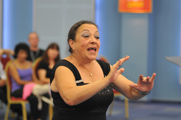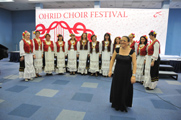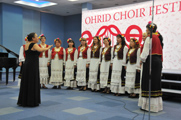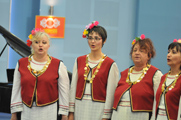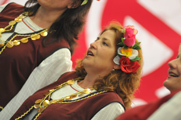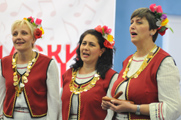
Folklore Formation "Chemerika"
Sofia, Bulgaria
Darena Popova - conductor
Folk Section
| Title | Composer | Lyrics |
|---|---|---|
| Dimianinka | Filip Kutev | Traditional Bulgarian |
| Dragana i Slaveia / Dragana and Nightingale | Filip Kutev | Traditional Bulgarian |
| Ne barzai Slancho / Not so fast sonny | Stefan Kanev | Traditional Bulgarian |
| Svatba / Wedding | Ivan Todorov | Traditional Bulgarian |
| Ergen deda / Single grand-father | Petar Liondev | Traditional Bulgarian |
The folklore vocal group Chemerika (hellebore) was founded in 1986. The original folkloric voices of the singers and their wide timbre spectrum allow them to maintain the characteristic sounds of different Bulgarian traditional regions. The individual qualities of the singers, combined with their professional attitude and notable desire to work lead them to an exceptionally rich and varied musical collection. The group has toured successfully abroad – Macedonia, Iraq, Syria, Jordan, Turkey and other countries, where the audience has always met its performances with enthusiasm and a storm of applause. The group has recorded in the Bulgarian National Television and produced its own album in 2004.
With the guidance of its conductor, Mrs. Darena Popova, in 2006 Chemerika became a prize-winner of the international choral festival in Preveza, Greece. In 2008 Chemerika became a laureate of the Veldhoven Festival, the Netherlands. In July 2009, the choir won the first place at the international choir festival of Alta Pusteria, Italy.
Mrs. Darena Popova graduated from the State Academy of Music, Sofia in 1984 with a major in choral conducting in the class of prof. Vassil Arnaudov. Since 1998, she has been a conductor of the academic choir Angel Manolov, Sofia and since 2005, the conductor of the folklore formation Chemerika. In the International Choral Contest in Torrevieja, Spain (2005 and 2009) Darena Popova won the Jose Hodar prize for Best Conductor. In the International Choir Competition, Freamunde (Portugal, 2010) she also won the prize Best Conductor. In 2008, she was awarded with a Gold plaque by Mati Bulgaria.
Sofia is the capital and the largest city in Bulgaria, with a population of more than 1.2 million people, at the foot of Vitosha Mountain. It is one of the oldest settlements in Europe, and numerous archaeological, cultural and historical monuments from its rich Thracian, Byzantine, Roman, Slav and Turkish history have been preserved among the modern edifices, the blend of the new and the old lending a charming quality to the capital. The modern city of Sofia was named in the 14th century after the basilica St. Sofia. Sofia has a wealth of museums and galleries, and boasts plenty of cultural entertainment. Today there are many archaeological sites in Sofia that display the city's diverse history - the castle gates and towers of Serdica, and public buildings and streets thousands of years old.




